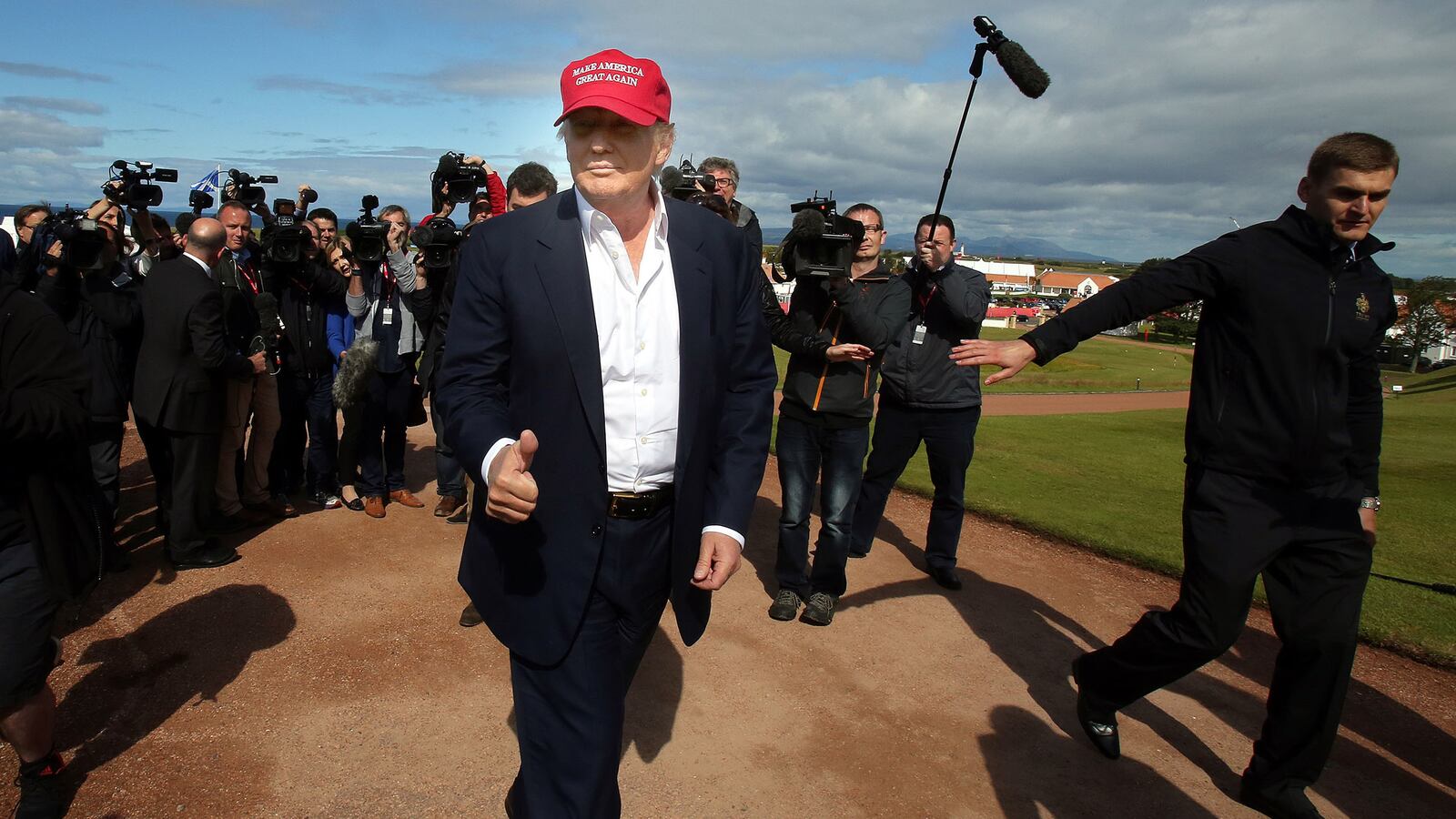Acres of pixels have been burned out by people writing about Trump, but what’s remarkable is how relatively little we have to say about him.
There’s no doubt his persona inspires descriptions as florid and memorable as the man himself. He’s “a barking carnival act” and “bloviating Godzilla,” He’s “a Mobius strip seamlessly moving from perception to reality,” “the world’s greatest troll” and a “superhero – but not in a good way.”
He is a “loose-haired agent of chaos,” with “the complexion of a creamsicle,” whose “hair swirls atop his head with disconcerting translucence — a cotton candy sculpture in the shape of a vending machine honey bun.” Trump’s “suits have a cut and sheen as if they came from the trunk sale of a visiting Bombay tailor staying in a cheap hotel in Trump’s native Queens and taking a nip between fittings.”
His stage presence is the result of “method acting that eventually supplanted whatever human-like personality he once possessed.” He is a “fat-haired yapping caricature of capitalism” currently “yelling crazy shit on his way through a Republican presidential primary while sporting a sad trombone haircut” as he serves up “a smelly soup of billionaire populism and yahoo nationalism—all flavored with a tangy dollop of old-timey racism.”
But wade through the purple prose and you will bark your shins on the same few points again and again. Almost all of Trump’s exhaustive coverage—both reporting and analysis—falls into a few categories.
The day-to-day coverage, the part of campaign reporting that for most candidates is made up of “went to this place, did this thing” facts, has its own consistent Trumpian rhythm: 1) Outrageous thing said or done. 2) Quotes from strategists about whether this will be it! 3) Nope!
(All three steps can probably be summed up as a collective “Welp!”)
When it comes to explaining his appeal, to figuring out what this improbable, sustained performance can mean, even our most thoughtful pundits scrabble after the same few tired tropes.
Liberals argue he’s the logical result of the GOP’s rightward trajectory, the inevitable end-game of Angry White Guy Bingo (Place a chip on the square marked “immigrants!,” etc.).
Some aim wider and proclaim that pervasive disillusionment explains the Trump phenomenon. He’s a vote against a corrupt system, for rebellion, “he’s the ultimate anti-politician.” (My own contribution fell in this genre, ticking off supporters’ “zero-sum mentality and vengeful nihilism.”) Particularly confounded conservatives try to rescue some dignity when they use him as an indictment of politics as a whole. Voters are responding to his authenticity, because, obviously, the billionaire “carries himself like an up-from-the-streets, never back down guy, who despises the elites as much as they hate him.” It’s the realnesss, not the racism! Though sentences such as, “It is precisely because people have lost their awe for the presidency that they imagine Mr. Trump as a viable president” do imply it’s all Barry O’Bummer’s fault.
Others ascribe the appeal of this “plutocratic populist from hell” to aspirational, greedhead brashness, Gordon Gecko without the suspenders, “Glengarry Glen Ross” but everyone gets steak knives. He symbolizes wealth, and “how ardently certain blowhards pursue it, how much the rest of us forgive in those who attain it, how thoroughly we equate money and accomplishment.” He’s perfected hip-hop’s “un-ironic American self-homage,” and, “If elected, he’s less likely to represent George W. Bush’s third term than Kanye West’s first one.”
True cynics blame his rise on country as a whole, our political-entertainment-industrial complex that gives celebrity importance and trivializes true civic engagement. It’s not a campaign; “It’s great programming.”
Indeed, these Trump Tropes are so rote that some journalists don’t feel the need to do actual reporting on the Trump phenomenon: They just gather up some New Hampshire-ites and prompt them to recite variations on the themes.
My own, hitherto private convictions about What Trump Means have swung between the suspicion that American voters are in some way in on the joke (come October he’ll pull off the rubber mask and reveal he’s been Stephen Colbert all along) and paranoia that whatever social progress we’ve made has, in fact, called down the wrath of Someone—it can’t be the God I’m familiar with—and Trump is our punishment. I mean, I believe gay marriage was worth it and everything but, geez. I have also considered the possibility that we are living in a science fiction dystopia. (To be sure, Thursday’s debate looks to be a combination of a Dark Mirror episode and the Red Wedding.)
The only thing that’s really changed in media’s month-long experiment in extended irony is the tone. It’s gone from reassuring dismissiveness to simmering dread, as writers find themselves having to hedge around the once-authoritative pronouncement of his ever-approaching demise. “The smart money's been on a bit of a losing streak,” admitted the Washington Post. And, in USA Today: “Hispanics for Trump? Oh yeah. Get ready. That’s a thing.” Pollster Charlie Cook squeezes in a qualifier – “Trump's candidacy is almost certainly destined to fail” – as 52 percent of Republicans say they want him to stay in.
I have told myself that this trepidation I feel is about the fate of the country, it stems from my concern over what kind of policy insanity could come from an actual Trump administration (with VP Mark Cuban and Secretary of State Sarah Palin, the production, and moral, values would seem to be less Game of Thrones and more Sharknado).
But I wonder if my unease—an apprehension I seem to share with many of my colleagues—is not about what might happen to the country, but what is in the process of happening, right now, to us in the media.
Jonah Goldberg, wading around in the pop-cultural tide pool for a Trump analog, likened him to the faux-bumpkin Machiavelli from “A Face in the Crowd,” Lonesome Rhodes. Goldberg deserves points for taste and proximity: The film’s tale of a talk-show radio host whose “plain talk” for “real folks” hides authoritarian, plutocratic ambitions certainly fits the general shape of the GOP’s last twenty years. In the movie, he falls from grace when a live microphone broadcasts his scheming;
But Rhodes today is better represented by Rush or Rove; most of the Republican party’s elected officials are the bought-and-paid-for genial suits that Rhodes controlled from behind the scenes. Trump is something else entirely, neither Rove nor Rush nor Rhodes nor complacent Koch-brother placeholder. Certainly, Trump could not fall prey to the same accidental exposure of unseemly opinions and plans that unraveled Rhodes (or Mitt Romney): Trump’s hypocrisy and offensiveness are on constant public display.
I’m not sure if pop culture can offer the exact right avatar for Trump—but A Face in the Crowd is still instructive, we just need to cast it differently. Lonesome Rhodes isn’t Trump, he’s us, he’s me—he’s the media in general.
The richness of our language about Trump as a man exposes the poverty of our analysis of him as a phenomenon. His refusal to go away exposes the superfluousness of our predictions. The churn of “Trump takes” is a real-time erosion of confidence in our ability to provide the only real service punditry provides: to make sense of what’s happening. His survival has shown how ephemeral narratives can be, and how permanent biases are. Our failure to adequately explain Trump, to tame him, reveals machinations and mistakes that usually go unnoticed. The Trump candidacy is the media’s ongoing hot mic moment. What we talk about when we talk about Trump is ourselves.






